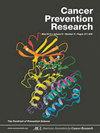Effect of Clonal Hematopoiesis Mutations and Canakinumab Treatment on Incidence of Solid Tumors in the CANTOS Randomized Clinical Trial
IF 2.6
3区 医学
Q2 ONCOLOGY
引用次数: 0
Abstract
Clonal hematopoiesis (CH) is more common in older persons and has been associated with an increased risk of hematological cancers and cardiovascular diseases. The most common CH mutations occur in the DNMT3A and TET2 genes and result in increased pro-inflammatory signaling. The Canakinumab Anti-inflammatory Thrombosis Outcome Study (CANTOS, NCT01327846) evaluated the neutralizing anti-IL-1β antibody canakinumab in 10,061 randomized patients with a history of myocardial infarction and persistent inflammation; DNA samples were available from 3,923 patients for targeted genomic sequencing. We examined the incidence of non-hematological malignancy by treatment assignment and CH mutations and estimated the cumulative incidence of malignancy events during trial follow-up. Patients with TET2 mutations treated with canakinumab had the lowest incidence of non-hematological malignancy across cancer types. The cumulative incidence of at least one reported malignancy was lower for patients with TET2 mutations treated with canakinumab vs those treated with placebo. These findings support a potential role for canakinumab in cancer prevention and provide evidence of IL-1β blockade cooperating with CH mutations to modify the disease course.克隆性造血突变和卡那单抗治疗对 CANTOS 随机临床试验中实体瘤发病率的影响
克隆性造血(CH)在老年人中更为常见,与罹患血癌和心血管疾病的风险增加有关。最常见的克隆性造血突变发生在 DNMT3A 和 TET2 基因中,会导致促炎信号的增加。卡那单抗抗炎血栓形成结果研究(CANTOS,NCT01327846)评估了中和抗IL-1β抗体卡那单抗在10061名有心肌梗死和持续炎症病史的随机患者中的应用情况;3923名患者的DNA样本可用于靶向基因组测序。我们根据治疗分配和CH突变研究了非血液恶性肿瘤的发生率,并估算了试验随访期间恶性肿瘤事件的累积发生率。在所有癌症类型中,接受卡那单抗治疗的TET2突变患者的非血液恶性肿瘤发病率最低。接受卡纳库单抗治疗的TET2突变患者与接受安慰剂治疗的患者相比,至少一种恶性肿瘤的累计发生率较低。这些发现支持了卡那单抗在癌症预防中的潜在作用,并提供了IL-1β阻断与CH基因突变合作改变病程的证据。
本文章由计算机程序翻译,如有差异,请以英文原文为准。
求助全文
约1分钟内获得全文
求助全文
来源期刊

Cancer Prevention Research
医学-肿瘤学
CiteScore
6.00
自引率
3.00%
发文量
173
审稿时长
1 months
期刊介绍:
Cancer Prevention Research publishes original studies, reviews, and perspectives in the field of cancer prevention. Its scope includes the molecular and cellular biology of premalignancy and early lesions; genetic and environmental risk factors; risk assessment and reduction; early detection research (cancer screening and diagnosis); and preventive interventions (chemoprevention, immunoprevention, and others) to intercept cancer development at early stages prior to initiation, promotion, or progression. The journal comprises preclinical, clinical, and translational research, with special attention given to molecular discoveries and an emphasis on building a translational bridge between the basic and clinical sciences.
 求助内容:
求助内容: 应助结果提醒方式:
应助结果提醒方式:


